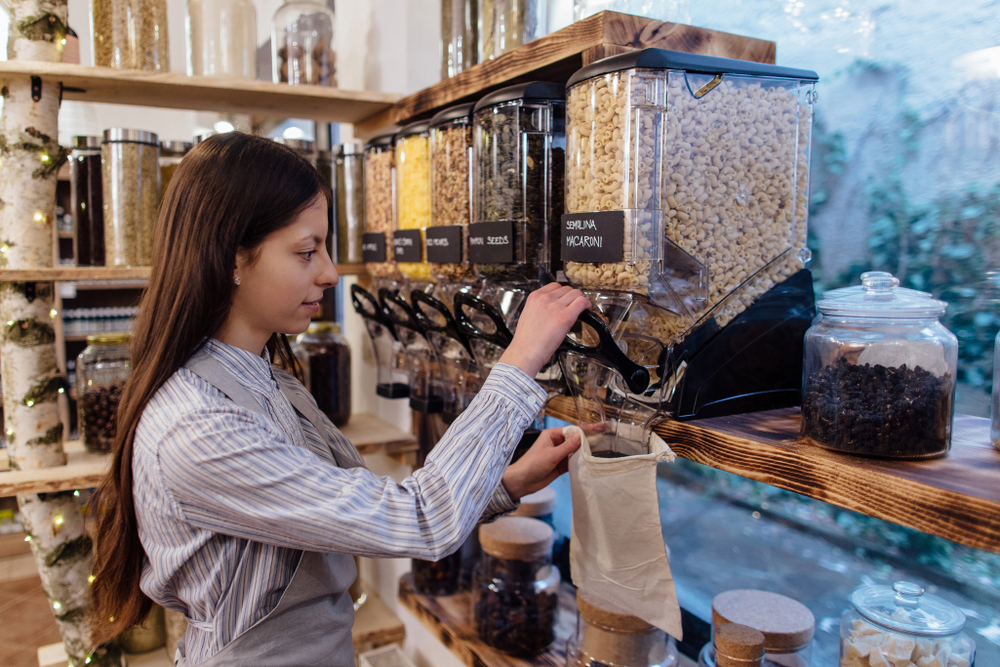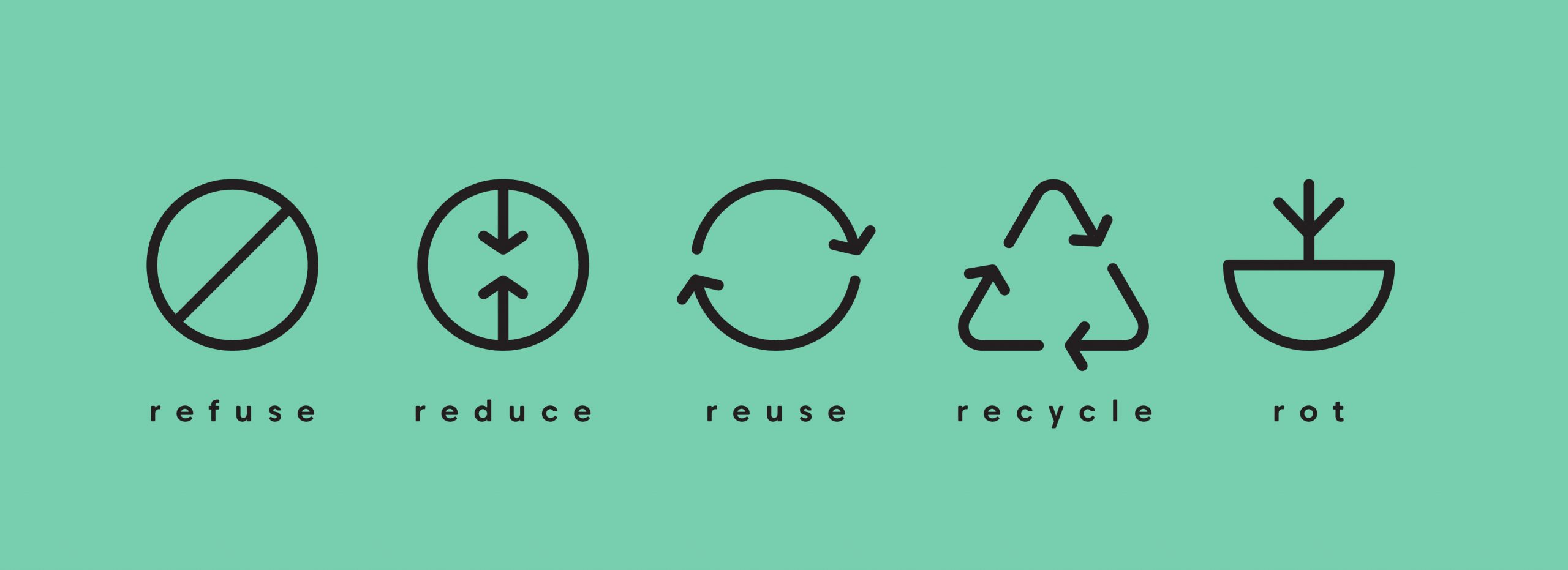This is the first in a series of articles on Low Impact Living. In this series, we will look at practical ways to lower our environmental impact, especially for those who have large families, live in a city or an apartment, or who don’t have access or the ability to live an idealized “zero-waste” lifestyle.

Zero Waste vs. Low Impact Living
Written by Penina Taylor
n 2015 a young woman named Lauren Singer gave a TEDx talk that shocked the world. She appeared on the stage with a 16oz glass jar which, she explained, contained all the trash she had made in three years. She was inspired by a blog she had come across as an environmental studies student, called “Zero Waste Home”, by a woman named Bea Johnson. Bea Johnson claimed that she, her husband and their two children lived a completely zero-waste life. Not only did the video go viral, so did the concept. And all of a sudden, people around the world were writing, blogging and vlogging about living a zero-waste life. The problem is, much like many of the inherent problems with our social media-centric world, that to live a truly zero-waste life is impossible for most people.
In her TEDx talk, Lauren explained that the first thing that she did was to stop buying packaged food. She said that she started bringing her own jars and bags to the store to fill with bulk, or package-free items. She talked about getting her vegetables from a farmer’s market. She explained that the second thing she did was to start making all of her own products. After all, our toothpaste comes in a package, our soap comes in a package. If you want to be waste-free, you have to be package-free, and therefore making your own products becomes a necessary part of the plan.
But there was a problem with what she was saying. For example, Lauren explained that the first product she made was toothpaste, out of baking soda. But how did she get the baking soda? Baking soda comes in a package. Okay, usually it’s sold in a cardboard carton, not a metal-infused plastic like toothpaste does, but still, it’s not zero waste. Even if you shop at a bulk shopping location, while you’ve certainly reduced your waste, that baking soda was still shipped to the store in a package.Yes, you could say it was much less waste, and cardboard is much more sustainable and environmentally friendly because you can compost it, and therefore a better choice for our environment, but it’s not zero waste. Unless she made the baking soda herself or went directly to the factory to fill her mason jar from their plant, she’s not making zero waste, just less waste. That’s still fantastic, but not accurate.
Lauren also mentioned in her talk that the third thing she did was to begin buying clothes second-hand. Not that this makes no waste, but it makes no new waste, and although I’m being semantical here, while buying clothes second-hand is definitely the most environmentally friendly way to buy your clothes, it’s also not zero-waste, because at some point, she will be disposing of those items.
Origin of the term “zero waste”
The term “zero waste” was not originally intended to refer to regular people, but rather, to businesses – specifically, manufacturers, who have the ability to ensure that their manufacturing process includes repurposing their waste into useful products, so that the end result is that they create products while adding no waste to our environment. This not only means making sure that they recycle leftovers from trimming and cutting products, but choosing products that are compostable or biodegradable in the first place and then repurposing them. For example, some of the chemicals used in producing certain products can be turned into biodegradable packing peanuts, etc. This is possible for a manufacturer because they have access to raw materials and equipment that can alter those materials into other products. This is not the case for a regular individual.
The Zero Waste International Alliance (ZIWA) defines zero waste as: “The conservation of all resources by means of responsible production, consumption, reuse, and recovery of products, packaging, and materials without burning and
with no discharges to land, water, or air that threaten the environment or human health.”
Is it possible for a human to be truly zero waste? Well, if you live on a large piece of land and build your home out of straw and clay, possibly. But consider what else you would have to do to be truly zero waste – you would need to not only compost your food scraps, but also your feces, using leaves or water for cleaning yourself afterwards. You would have to use only naturally occurring plant or animal products to create your cleaning products, so that the “gray water” you produce from showering and washing up could be re-used in the garden. You would have to make your own clothes using completely natural and compostable materials. And you’d have to live off only what you can make yourself or obtain directly from a factory. Once a product is shipped, it produces waste, and by purchasing it, you have contributed to the production of waste. Not only is this an extremely labor-intensive way for an individual to live, but it would also be a full-time job, so unless the person is independently wealthy, it’s just not possible.
But that doesn’t mean it’s hopeless. Scientists and environmentalists have been telling us for a long time that our planet is in danger, and it’s our fault. If we care about our world – animals and humans – we must change the way we live, or our children or grandchildren will find much of the planet uninhabitable. But the truth is, this is a big planet, and if every human made even a small effort to change their negative impact, it would make a big difference. In fact, studies have shown that we can reverse the damage we’ve already caused – look at what happened to the hole in the ozone layer after the world banned CFCs. There were also statistically significant changes to our environment during 2020 when practically the entire globe was in lockdown because of the Coronavirus.
While I take issue with the term zero waste, Bea Johnson made some excellent points in her own TEDx talk from 2016. In it she shared what she calls the 5 Rs – Refuse, Reduce, Reuse, Recycle, and Rot. She explains that top of the list is to refuse – to say “no” to things we do not use. You might think of this as minimalism, but it goes far beyond not having too much clutter in our homes. It’s about signing up to receive invoices and receipts, etc. electronically, to get rid of the paper mail we receive. It’s about choosing online magazines instead of print (see what I did there?), it’s about not only refusing to use single-use plastics like water bottles and grocery bags, but also refusing freebies. Yes, refusing freebies. 90% of the time things we receive for free only take up space in our homes until we finally let go of them and – send them to the trash! On top of that, every time we accept a gift – like taking a free pen or other gadget from a conference, we create the demand to create more.
The biggest issue with the term “zero waste” is that we, as humans, have a tendency to want to do everything perfectly. And we often get to a place where we say in our heads, if I can’t do it perfectly, why bother? If I work full time and can’t make my own toothpaste, I might as well just
buy disposables, right? We tend to be all or nothing, and unfortunately, that tendency is killing us and all the other life on earth.
Orthodox Jews have an added complication – we often have large families, have the equivalent of Thanksgiving every week and host guests on a regular basis. Caring for our planet is only one Jewish value among many. Combine that with working full time and sanity beats out sustainability every time, so what can we do?
Well, first of all, we have to get out of the “zero waste” mentality and into the “low impact living” mentality. That small change takes the task from impossible to doable.
One Shabbat I did an experiment. I regularly host many guests for Shabbat and end up using a lot of aluminum foil in the process. Aluminum foil covers my blech, aluminum foil covers all the containers of food I made for Shabbat, and aluminum foil wraps my challah, so it freezes and reheats nicely.
So, I decided to see if it was even remotely possible to have an aluminum-free Shabbat. Instead of covering my blech, I used upside-down cookie sheets to add a layer, and hopefully reduce spills getting directly (and permanently cooked on) my blech. Instead of covering my pans with foil, I kept everything in reusable containers and then transferred them to baking pans which I then covered with either a cookie sheet, cutting board or plate (depending on size and shape). Note: now I have silicon covers that are heat resistant and can go from fridge to blech and back to the fridge without harm. For the challahs, I reheated them wrapped in a tea towel instead of aluminum foil. That doesn’t solve the problem of how to freeze them, but in this case, they were freshly made.
From this experiment, I realized that while I may not completely rid my life of aluminum foil, I could reduce its use by about 90% and with very little inconvenience. And that’s only one example of ways that we can make small changes that will have a big impact on how much trash we produce, and how much we negatively impact our environment.
Not all the changes that we need to, or might want to, make are so easy, especially for Jewish families. And it’s not just Shabbat and holidays that make it harder. In general, we tend to live in cities which makes composting and gardening much more difficult, if not impossible. We tend to have little free time for making our own household products, or driving farther to find stores that accomodate a low-impact lifestyle. But caring for our planet is a Jewish principle that goes all the way back to the Garden of Eden itself. In Bereshit (Genesis) 2:15, it says,
ויקח ד’ א-להים את האדם וינחהו בגן-עדן לעבדה ולשמרה
God took the human and placed him in the Garden of Eden to work and protect it.
Living a truly zero-waste lifestyle may be an option only available to a privileged few, but low impact living is something we can all do, and as Jews, it’s something we must do.

Related Articles
Related
Help! I’m Bored
Ouch, I walked into the open closet door. The green and yellow Sprite bottle was sticking out of the bulging recycling bag. How many times must I ask my children to return the bottles? It’s summer, it’s raining, and the pool is closed. My three children are looking at...
Fun Upcycling Ideas & Projects
Repurposing, upcycling, recycling - whatever you want to call it, finding a new use for something that would otherwise end up in a landfill or dump is a great way to do your part to reduce waste in your community. There are hundreds, if not thousands, of websites...
7 Makeup Brands That Are Cruelty-Free
High-End, Luxury, Moderate, Vegan Options, New on Market. Concerned consumers are looking beyond the familiar brands of yesterday. Here’s why. Kindness and compassion may be trending today, but they’ve always been core values in Judaism. Although other humans...
